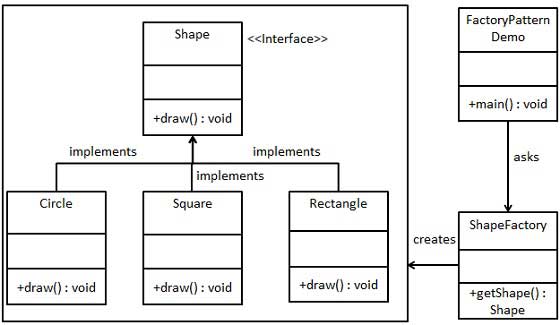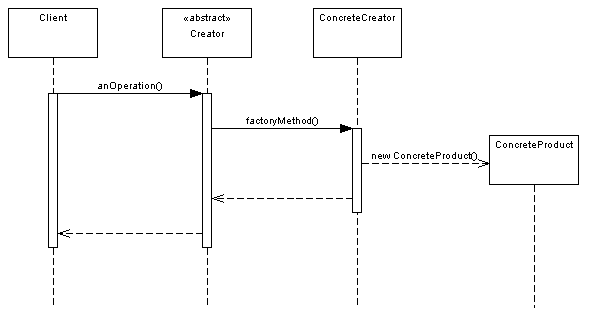Factory design pattern in Java, Kotlin and Python Development 20.09.2016
Creational Design Patterns provide solution to instantiate an object in the best possible way for specific situations. Following design patterns come under this category.
Factory pattern provides a way to delegate the instantiation logic to child classes.
Factory design pattern is used when we have a super class with multiple sub-classes and based on input, we need to return one of the sub-classes. This pattern takes out the responsibility of instantiation of a class from client program to the factory class.
Super class in factory pattern can be an interface or a normal Java class. In Python it is abstract class in most cases.
Benefits:
- Factory pattern provides approach to code for interface rather than implementation.
- Factory pattern removes the instantiation of actual implementation classes from client code, making it more robust, less coupled and easy to extend.
- Factory pattern provides abstraction between implementation and client classes through inheritance.
We're going to create a Shape interface and concrete classes implementing the Shape interface. A factory class ShapeFactory is defined as a next step.
Demo class will use ShapeFactory to get a Shape object. It will pass information (CIRCLE/ RECTANGLE/ SQUARE) to ShapeFactory to get the type of object it needs.
Now let's take a look at a sequence diagram to see how this pattern behaves:
Usage of Factory design pattern:
- When a class doesn't know what sub-classes will be required to create
- When a class wants that its sub-classes specify the objects to be created.
- When the parent classes choose the creation of objects to its sub-classes.
Java
Create an interface.
# file Shape.java
public interface Shape {
void draw();
}
Create concrete classes implementing the same interface.
# file Rectangle.java
public class Rectangle implements Shape {
@Override
public void draw() {
System.out.println("Inside Rectangle::draw() method.");
}
}
# file Square.java
public class Square implements Shape {
@Override
public void draw() {
System.out.println("Inside Square::draw() method.");
}
}
# file Circle.java
public class Circle implements Shape {
@Override
public void draw() {
System.out.println("Inside Circle::draw() method.");
}
}
Create a Factory to generate object of concrete class based on given information.
# file ShapeFactory.java
public class ShapeFactory {
public Shape getShape(String shapeType){
if(shapeType == null){
return null;
}
if(shapeType.equalsIgnoreCase("CIRCLE")){
return new Circle();
} else if(shapeType.equalsIgnoreCase("RECTANGLE")){
return new Rectangle();
} else if(shapeType.equalsIgnoreCase("SQUARE")){
return new Square();
}
return null;
}
}
Use the Factory to get object of concrete class by passing an information such as type.
# file FactoryPatternDemo.java
public class FactoryPatternDemo {
public static void main(String[] args) {
ShapeFactory shapeFactory = new ShapeFactory();
Shape shape1 = shapeFactory.getShape("CIRCLE");
shape1.draw();
Shape shape2 = shapeFactory.getShape("RECTANGLE");
shape2.draw();
Shape shape3 = shapeFactory.getShape("SQUARE");
shape3.draw();
}
}
Python 3
Create base class.
import abc
class Shape(metaclass=abc.ABCMeta):
@abc.abstractmethod
def draw(self):
pass
Create concrete classes implementing the same base class.
class Rectangle(Shape):
def draw(self):
print("Inside Rectangle::draw() method.")
class Square(Shape):
def draw(self):
print("Inside Square::draw() method.")
class Circle(Shape):
def draw(self):
print("Inside Circle::draw() method.")
Create a Factory to generate object of concrete class based on given information.
class ShapeFactory(object):
@staticmethod
def get_shape(shape_type):
if shape_type == 'CIRCLE':
return Circle()
elif shape_type == 'RECTANGLE':
return Rectangle()
elif shape_type == 'SQUARE':
return Square()
return null
Use the Factory to get object of concrete class by passing an information such as type.
if __name__ == '__main__':
rectangle = ShapeFactory.get_shape('RECTANGLE')
rectangle.draw()
circle = ShapeFactory.get_shape('CIRCLE')
circle.draw()
square = ShapeFactory.get_shape('SQUARE')
square.draw()
Kotlin
Create an interface.
interface Shape {
fun draw()
}
Create concrete classes implementing the same interface.
class Rectangle: Shape {
override fun draw() {
println("Inside Rectangle::draw() method.")
}
}
class Square: Shape {
override fun draw() {
println("Inside Square::draw() method.")
}
}
class Circle: Shape {
override fun draw() {
println("Inside Circle::draw() method.")
}
}
Create a Factory to generate object of concrete class based on given information.
class ShapeFactory {
fun getShape(shapeType: String): Shape {
return when(shapeType.trim()) {
"CIRCLE" -> Circle()
"RECTANGLE" -> Rectangle()
"SQUARE" -> Square()
else -> throw RuntimeException("Unknown shape $shapeType")
}
}
}
Use the Factory to get object of concrete class by passing an information such as type.
fun main(args: Array<String>) {
val shapeFactory = ShapeFactory()
val shape1: Shape = shapeFactory.getShape("CIRCLE")
shape1.draw()
val shape2: Shape = shapeFactory.getShape("RECTANGLE")
shape2.draw()
val shape3: Shape = shapeFactory.getShape("SQUARE")
shape3.draw()
}
Quote
Categories
- Android
- AngularJS
- Databases
- Development
- Django
- iOS
- Java
- JavaScript
- LaTex
- Linux
- Meteor JS
- Python
- Science
Archive ↓
- September 2024
- December 2023
- November 2023
- October 2023
- March 2022
- February 2022
- January 2022
- July 2021
- June 2021
- May 2021
- April 2021
- August 2020
- July 2020
- May 2020
- April 2020
- March 2020
- February 2020
- January 2020
- December 2019
- November 2019
- October 2019
- September 2019
- August 2019
- July 2019
- February 2019
- January 2019
- December 2018
- November 2018
- August 2018
- July 2018
- June 2018
- May 2018
- April 2018
- March 2018
- February 2018
- January 2018
- December 2017
- November 2017
- October 2017
- September 2017
- August 2017
- July 2017
- June 2017
- May 2017
- April 2017
- March 2017
- February 2017
- January 2017
- December 2016
- November 2016
- October 2016
- September 2016
- August 2016
- July 2016
- June 2016
- May 2016
- April 2016
- March 2016
- February 2016
- January 2016
- December 2015
- November 2015
- October 2015
- September 2015
- August 2015
- July 2015
- June 2015
- February 2015
- January 2015
- December 2014
- November 2014
- October 2014
- September 2014
- August 2014
- July 2014
- June 2014
- May 2014
- April 2014
- March 2014
- February 2014
- January 2014
- December 2013
- November 2013
- October 2013

